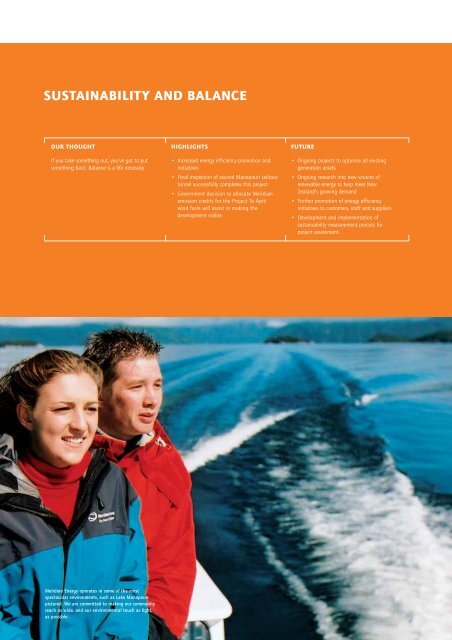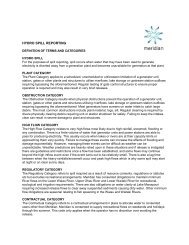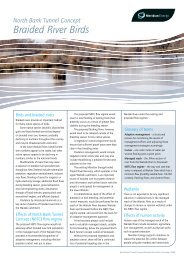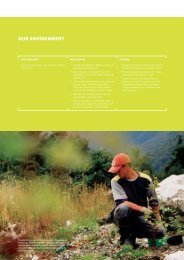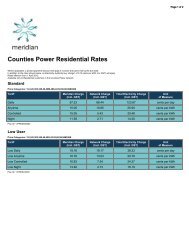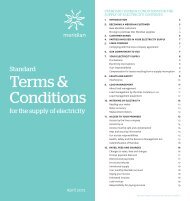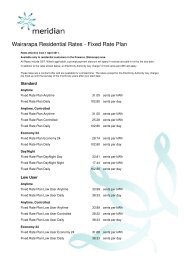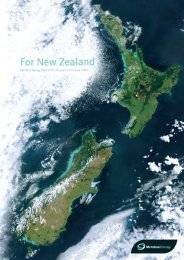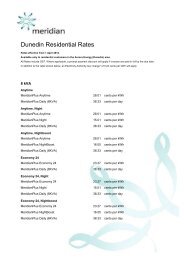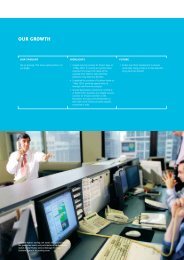sustainability and balance - Annual Report 2003 - Meridian Energy
sustainability and balance - Annual Report 2003 - Meridian Energy
sustainability and balance - Annual Report 2003 - Meridian Energy
You also want an ePaper? Increase the reach of your titles
YUMPU automatically turns print PDFs into web optimized ePapers that Google loves.
SUSTAINABILITY AND BALANCE<br />
OUR THOUGHT<br />
If you take something out, you’ve got to put<br />
something back. Balance is a life necessity.<br />
HIGHLIGHTS<br />
• Increased energy efficiency promotion <strong>and</strong><br />
initiatives<br />
• Final inspection of second Manapouri tailrace<br />
tunnel successfully completes this project<br />
• Government decision to allocate <strong>Meridian</strong><br />
emission credits for the Project Te Äpiti<br />
wind farm will assist in making the<br />
development viable.<br />
FUTURE<br />
• Ongoing projects to optimise all existing<br />
generation assets<br />
• Ongoing research into new sources of<br />
renewable energy to help meet New<br />
Zeal<strong>and</strong>’s growing dem<strong>and</strong><br />
• Further promotion of energy efficiency<br />
initiatives to customers, staff <strong>and</strong> suppliers<br />
• Development <strong>and</strong> implementation of<br />
<strong>sustainability</strong> measurement process for<br />
project assessment.<br />
MERIDIAN ENERGY LIMITED REPORT FOR THE YEAR ENDING JUNE <strong>2003</strong><br />
<strong>Meridian</strong> <strong>Energy</strong> operates in some of the most<br />
spectacular environments, such as Lake Manapouri<br />
pictured. We are committed to making our community<br />
reach as wide, <strong>and</strong> our environmental touch as light,<br />
as possible.<br />
18
OUR REFERENCE POINT<br />
“We can cope with growing dem<strong>and</strong> for electricity<br />
while continuing to make progress towards a more<br />
sustainable electricity industry… by advancing on<br />
three fronts:<br />
• Increasing investment in renewable sources of<br />
energy for electricity generation<br />
• Increasing the opportunities for dem<strong>and</strong>–side<br />
participation in the electricity market<br />
• Increasing energy efficiency <strong>and</strong> conservation.”<br />
Hon Pete Hodgson, Minister of <strong>Energy</strong>, address to<br />
Electricity Engineers’ Association of New Zeal<strong>and</strong><br />
Conference, 20 June <strong>2003</strong>.<br />
The “<strong>balance</strong>” concept that is so prominent in<br />
sustainable development thinking is a good<br />
description of the future direction of the<br />
New Zeal<strong>and</strong> electricity industry.<br />
During the last year the dynamics of supply <strong>and</strong><br />
dem<strong>and</strong> were highlighted when New Zeal<strong>and</strong>’s<br />
electricity supply came under severe pressure early in<br />
winter <strong>2003</strong>. A dry summer <strong>and</strong> autumn combined<br />
with a shortage of thermal fuel stocks <strong>and</strong> a<br />
reduction in Maui gas output signalled very tight<br />
supply over the high-dem<strong>and</strong> winter period.<br />
The tight supply position was eased in May by<br />
unseasonal rainfall in all catchments <strong>and</strong> the<br />
announcement of new thermal fuel contracts,<br />
however the need for careful management <strong>and</strong><br />
disclosure of fuel stocks is likely to be a dominant<br />
theme over the next three years.<br />
SUPPLY<br />
Constraints on increasing electricity supply include:<br />
• Potentially long lead times for new production<br />
to come on-stream due to the regulatory<br />
environment<br />
• Increasingly competing dem<strong>and</strong>s for water<br />
• Cost <strong>and</strong> availability of thermal fuels<br />
• The appropriateness of energy projects in<br />
relation to New Zeal<strong>and</strong>’s Kyoto commitments<br />
<strong>and</strong> desire for <strong>sustainability</strong><br />
• Transmission capacity – investment is needed to<br />
upgrade transmission lines to deliver additional<br />
electricity supply to end users.<br />
Industry players are pursuing various options to<br />
address this challenge. For its part, <strong>Meridian</strong> is<br />
committed to sustainable energy solutions to meet<br />
rising dem<strong>and</strong>, in particular those using water <strong>and</strong><br />
wind. To read more about our growth projects, go<br />
to page 40.<br />
As the largest hydro generator in New Zeal<strong>and</strong>, the<br />
implications of the growing dem<strong>and</strong>s for water are<br />
vast. <strong>Meridian</strong> is facing increasing competition for<br />
water in the Waitaki catchment, in respect of both<br />
current <strong>and</strong> future uses for water. Without any real<br />
water allocation policy operative within the<br />
catchment all existing <strong>and</strong> future users face<br />
uncertainty in relation to their entitlements to take<br />
<strong>and</strong> use water. This was reflected in the number of<br />
submissions lodged on Environment Canterbury’s<br />
latest <strong>Annual</strong> Plan where over 30 submitters,<br />
including <strong>Meridian</strong>, requested a water allocation<br />
plan for the Waitaki catchment. For more detail on<br />
what <strong>Meridian</strong> has done to clarify water allocation<br />
in the past year, see page 21.<br />
DEMAND-SIDE MANAGEMENT<br />
<strong>Meridian</strong> has been working with many industrial<br />
customers on dem<strong>and</strong>-side management since<br />
inception, but particularly since the 2001 energy<br />
crisis. When the country was faced with a similar<br />
situation in autumn <strong>2003</strong>, we increased these efforts<br />
<strong>and</strong> joined industry initiatives.<br />
The challenge now is to help New Zeal<strong>and</strong>ers<br />
appreciate the need for a mind shift to sustained<br />
energy efficiency efforts. <strong>Energy</strong> efficiency is an<br />
integral part of <strong>Meridian</strong>’s ongoing endeavours, <strong>and</strong><br />
we will continue to work with customers to effect this.<br />
Lake Manapouri, looking towards the<br />
power station at West Arm.
SUSTAINABILITY AND BALANCE<br />
INFLOWS AND SPOT PRICES JANUARY–JUNE<br />
250<br />
1,400<br />
200<br />
1,200<br />
1,000<br />
Average spot price $<br />
150<br />
100<br />
800<br />
600<br />
400<br />
GWh<br />
50<br />
200<br />
JAN<br />
FEB<br />
MAR<br />
APR<br />
MAY<br />
JUN<br />
0<br />
0<br />
75 Year average inflows Average spot price $ <strong>2003</strong> Waitaki inflows 2001 Waitaki inflows <strong>2003</strong><br />
“ I’D LIKE TO SAY A BIG THANK<br />
YOU TO THE ENERGY SAVER TEAMS<br />
WHO VISITED ME. THEY DID A<br />
FANTASTIC JOB INSTALLING ENERGY<br />
SAVINGS’ PRODUCTS IN MY HOME<br />
AND WERE VERY PROFESSIONAL<br />
AND FRIENDLY AND SINCE THEN MY<br />
POWER BILL HAS DROPPED BY<br />
ABOUT $15 A MONTH.”<br />
DEBBY GEAYLEY<br />
CHRISTCHURCH CUSTOMER.<br />
OUR PROGRESS<br />
MANAGING ANOTHER DRY YEAR<br />
For the second time in three years, winter <strong>2003</strong><br />
provided a timely reminder from nature that supplies<br />
of natural resources are not limitless. The low inflows<br />
in autumn, combined with reduced thermal<br />
generation, led to soaring spot prices on the<br />
electricity market. This meant that <strong>Meridian</strong> used its<br />
lake storage – already lower as a result of<br />
unseasonally low summer rainfall – earlier than<br />
usual. This had a direct impact on our financial<br />
performance as <strong>Meridian</strong> met its fixed price<br />
obligations to its customers by buying some of its<br />
requirements from the very high spot market. Our<br />
customers were spared this volatility at a significant<br />
cost to <strong>Meridian</strong>’s own profitability.<br />
As soon as it was apparent that nationally we had<br />
a serious problem, we initiated a series of projects<br />
to help prepare for <strong>and</strong> manage an electricity<br />
shortage situation.<br />
• We assessed the impact of reducing lake levels<br />
below their typical operating range – balancing<br />
adverse environmental impacts <strong>and</strong> stakeholder<br />
concerns with the social <strong>and</strong> economic need for<br />
continued supply of electricity.<br />
• We worked closely with large organisations that<br />
have on-site emergency generators, preparing<br />
them to run continuously if the high spot prices<br />
continued.<br />
• We worked on an initiative in Christchurch in<br />
conjunction with Orion to seek resource consents<br />
to enable diesel generators in Christchurch to<br />
operate if required.<br />
• We briefed key industry groups to encourage<br />
industry savings <strong>and</strong> explain the situation.<br />
• We worked with network companies on<br />
contingency plans for potential rolling blackouts.<br />
• <strong>Meridian</strong> was an early <strong>and</strong> active member of the<br />
industry-wide Target 10 national media<br />
campaign to encourage New Zeal<strong>and</strong>ers to<br />
make voluntary savings.<br />
• We also developed our own energy savings<br />
initiatives to encourage <strong>and</strong> enable <strong>Meridian</strong><br />
customers to save. These included:<br />
– A community rewards scheme that resulted<br />
in a donation to Plunket of $500,000 cash<br />
<strong>and</strong> $150,000 worth of goods <strong>and</strong> services<br />
to reward New Zeal<strong>and</strong>ers for the savings<br />
they made during the Target 10 campaign.<br />
(See case study on page 46.)
– Rewards for the top 10,000 energy savers<br />
among <strong>Meridian</strong>’s customers, who will<br />
receive a $100 credit on their pre-Christmas<br />
power bill, with the option of donating it to<br />
one of 10 charities<br />
– An energy savings assessments <strong>and</strong><br />
makeovers competition with five residental<br />
<strong>and</strong> five business winners<br />
– In partnership with Community <strong>Energy</strong><br />
Action <strong>and</strong> <strong>Energy</strong>Smart, we had teams<br />
travelling around Christchurch installing free<br />
energy-saving products, such as cylinder<br />
wraps, energy-saving lights, draught<br />
excluders <strong>and</strong> water-saving showerheads, in<br />
low-income households. The <strong>Energy</strong> Saver<br />
Vans teams knocked on 3,875 doors <strong>and</strong><br />
visited 1,555 homes in six weeks, installing<br />
5,500 energy-saving products.<br />
We also made significant internal power savings<br />
to do our bit towards the 10% savings target.<br />
Cumulative energy savings for all our offices reached<br />
as high as 35% throughout the month of May,<br />
falling to 15% through June as the winter power<br />
crisis eased. These savings were the result of<br />
operating a diesel generator at one of our sites, as<br />
well as a sustained savings campaign in all offices.<br />
WATER ALLOCATION<br />
We are participating actively in the development<br />
of Environment Canterbury’s Natural Resources<br />
Regional Plan, which will ultimately set out a<br />
framework for water allocation policy for the region.<br />
It is unclear as to when an allocation regime for the<br />
Waitaki will be added to the Plan.<br />
In parallel, <strong>Meridian</strong> has been engaged in a process<br />
with the Environment Court to clarify for the public<br />
record our existing entitlements to take water under<br />
our resource consents granted in 1990. This has<br />
been necessary because of confusion within the<br />
public arena as to how <strong>Meridian</strong>’s consents work<br />
<strong>and</strong> what they provide for.<br />
Our <strong>Energy</strong> Saver Vans installed free<br />
<strong>Energy</strong> Saving products for over 1500<br />
Christchurch homes.<br />
CASE STUDY<br />
DUNEDIN ENERGY CENTRE<br />
“ WHILE THE MERIDIAN SOLUTIONS APPROACH TO<br />
ENERGY SYSTEMS’ OUTSOURCING AND MANAGEMENT<br />
IS RELATIVELY NEW TO NEW ZEALAND, IT CERTAINLY<br />
PROVIDED US WITH LONG-TERM RISK MANAGEMENT<br />
OPTIONS AND VALUABLE EXPENDITURE REDUCTION<br />
STRATEGIES.”<br />
EWAN SOPER<br />
OTAGO DISTRICT HEALTH BOARD CHIEF<br />
OPERATING OFFICER.<br />
In June 2002, <strong>Meridian</strong> Solutions bought the Dunedin<br />
<strong>Energy</strong> Centre from Otago District Health Board (ODHB).<br />
The Dunedin <strong>Energy</strong> Centre supplies steam for process<br />
heating <strong>and</strong> building services to a number of <strong>Meridian</strong><br />
Solutions customers located near Dunedin Hospital in<br />
central Dunedin city, including the ODHB, Cadbury<br />
Confectionery Limited <strong>and</strong> the University of Otago.<br />
<strong>Meridian</strong> Solutions has upgraded control systems <strong>and</strong><br />
installed a baghouse (filter system) on the chimney stack.<br />
These improvements have already cleaned up emissions to<br />
the extent that previously visible plume has now disappeared<br />
<strong>and</strong> an estimated 50 tonnes of fine dust per annum are<br />
being removed from our Dunedin air. (Read more about<br />
<strong>Meridian</strong> Solutions in the Growth section on page 43.)
SUSTAINABILITY AND BALANCE<br />
CASE STUDY<br />
SECOND MANAPOURI TAILRACE TUNNEL INSPECTION<br />
“ I AM VERY PLEASED TO SAY THAT WHEN WE<br />
INSPECTED THE TUNNEL AFTER 12 MONTHS’<br />
OPERATION, NO DAMAGE WAS OBSERVED.<br />
THE FINAL INSPECTION MEANS THAT THE TUNNEL<br />
PROJECT IS NOW COMPLETE. IT HAS EXCEEDED<br />
OUR EXPECTATIONS ON PERFORMANCE.”<br />
KEN SMALES<br />
GENERATION DIRECTOR.<br />
When the second tailrace tunnel at Manapouri was<br />
dewatered <strong>and</strong> inspected in March, it concluded the project.<br />
The Manapouri power station was shut down between 1am<br />
<strong>and</strong> 5am (a low dem<strong>and</strong> time for the national grid) early<br />
on 1 March. This enabled the huge stoplogs at both the<br />
head <strong>and</strong> outlet of the second tunnel to be lowered into<br />
place, effectively isolating the second tunnel, <strong>and</strong> meaning<br />
that when the station operations resumed, only the first<br />
tunnel discharged water from the station.<br />
With the stoplogs in place, the remaining water in the<br />
tunnel, some of which is below sea level, was pumped out.<br />
After four days of pumping, the tunnel was empty enough<br />
to enter <strong>and</strong> carry out the inspection.<br />
The inspection showed that the tunnel was in excellent<br />
condition, with members of the team commenting that it<br />
“looked better than before since it’s had a good wash”.<br />
After the inspection, the tunel was rewatered, <strong>and</strong> again,<br />
station production shut down for a few hours while the<br />
stoplogs at the tunnel entrance were raised again.<br />
In order to protect <strong>Meridian</strong>’s value, <strong>and</strong> without any<br />
water allocation policy, it has been necessary to<br />
oppose numerous water takes from farmers, both<br />
large <strong>and</strong> small, who are wishing to take water for<br />
irrigation purposes, some of which are for use<br />
outside the Waitaki catchment (<strong>Meridian</strong> only<br />
opposes new abstractions, not existing intakes for<br />
water). Many of these takes are not large in<br />
themselves, but we have significant concerns over<br />
the cumulative impact of these water takes on our<br />
existing consents.<br />
We recognise that irrigation is a major value driver in<br />
the farming sector <strong>and</strong> that the sector is important<br />
to New Zeal<strong>and</strong>’s economy. <strong>Meridian</strong> has undertaken<br />
extensive research <strong>and</strong> investigations into alternative<br />
water sources <strong>and</strong> ways to harvest water for<br />
irrigation purposes. We have also researched<br />
different approaches to water allocation. Our<br />
objective is to source practical solutions that meet<br />
our own needs <strong>and</strong> those of other water users. We<br />
consider that hydro <strong>and</strong> irrigation don’t have to be<br />
mutually exclusive, but that if worked through in a<br />
planned <strong>and</strong> integrated way, the two uses of water<br />
could be managed in a mutually beneficial way.<br />
Project Aqua is an example of this.<br />
SECOND MANAPOURI TAILRACE TUNNEL<br />
Last year we completed the second Manapouri<br />
tailrace tunnel, a major energy efficiency project<br />
that made the Manapouri power station 16% more<br />
productive, increasing the station’s output by<br />
640 GWh a year, enough to power the equivalent<br />
of an additional 64,000 homes.<br />
This year the final tunnel inspection was undertaken.<br />
This entailed closing off <strong>and</strong> dewatering the second<br />
tunnel for 10 days, <strong>and</strong> carrying out a detailed<br />
inspection of the condition <strong>and</strong> stability of the<br />
tunnel. We were extremely pleased with our findings<br />
marking the successful completion of the project.<br />
CLIMATE CHANGE<br />
<strong>Meridian</strong> welcomes the Government’s ratification of<br />
the Kyoto Protocol in December 2002 <strong>and</strong> the<br />
business opportunities that will arise from it. To date<br />
this includes the allocation of emission credits that
assist in making the Project Te Äpiti wind farm<br />
development viable (read more about Project Te Äpiti<br />
on page 42). We look forward to participating in the<br />
forthcoming Project Mechanism tender.<br />
SUSTAINABLE DEVELOPMENT AT MERIDIAN<br />
Last year we outlined how a <strong>sustainability</strong><br />
philosophy has been built into <strong>Meridian</strong>’s framework<br />
since inception <strong>and</strong> set ourselves the challenge to<br />
integrate it further into everything that we do.<br />
In the coming year we plan to put a structure around<br />
our project evaluation processes <strong>and</strong> we are currently<br />
reviewing value accounting <strong>and</strong> <strong>sustainability</strong><br />
models that may help with this.<br />
We will also be reviewing our Sustainability Policy<br />
(developed in June 2000) to reflect better the<br />
<strong>balance</strong> between environmental, social <strong>and</strong><br />
economic needs throughout <strong>Meridian</strong>.<br />
CO 2 FOOTPRINT<br />
Using the same methodology as last year<br />
(L<strong>and</strong>care’s EBEX21 model), <strong>and</strong> the same source<br />
data, <strong>Meridian</strong>’s CO 2 footprint for 2002/03 shows<br />
a 10.8% increase over last year’s figures. Most of<br />
this can be attributed to greater consumption of<br />
resources due to an 11% increase in staff <strong>and</strong><br />
increased business activity.<br />
However, the figure of record that we want to use as<br />
a benchmark going forward shows an 83% increase.<br />
This is due to a change in scope of what is<br />
measured. This year we have included the diesel<br />
used in the boats on Lake Manapouri, which was<br />
not included in last year’s calculation.<br />
This emphasises the importance of setting <strong>and</strong><br />
maintaining a clear scope. To avoid confusion<br />
going forward, the CO 2 footprint calculations<br />
include <strong>Meridian</strong>’s core business, <strong>Meridian</strong> Solutions<br />
<strong>and</strong> DamWatch. They do not include any other newly<br />
purchased subsidiaries or external contractors, but<br />
consideration will be given as to the most appropriate<br />
treatment of these companies in the future.<br />
It is interesting to note that the impact of <strong>Meridian</strong>’s<br />
CO 2 footprint for 2002/03 could be offset by about<br />
five days’ generation from the proposed Te Äpiti<br />
wind farm or about two days’ generation from<br />
Manapouri power station taking into account the<br />
second tailrace tunnel.<br />
The latest greenhouse gas (GHG) data for the<br />
electricity sector indicates that a total of 5,579,000<br />
tonnes of CO 2 was emitted by the sector in 2002 3 .<br />
So, while <strong>Meridian</strong> provided approximately 29% of<br />
New Zeal<strong>and</strong>’s electricity 4 , it generated less than<br />
0.04% of the GHG emissions.<br />
CO2 FOOTPRINT<br />
ENERGY TYPE <strong>2003</strong> UNIT TC0 2 2002 UNIT TC0 2<br />
(using EBEX21<br />
(using EBEX21<br />
Emission Factor<br />
Emission Factor<br />
of 145.9 g C02<br />
of 149.3 g C02<br />
per KWh<br />
per KWh<br />
Electricity 2,570,590 KWh 375 2,465,000 KWh 416<br />
Air - International 1,739,896 km 191 1,363,000 km 150<br />
Air - Domestic 2,294,736 km 413 1,795,000 km 323<br />
Petrol 66,275 L 152 70,619 L 162<br />
Diesel 26,048 L 68 12,086 L 32<br />
Total C02 Excluding Manapouri 1,200 1,083<br />
Manapouri Station/Boat Diesel 302,229 L 791 - L -<br />
Total C02 Including Boats 1,991 1,083<br />
3 <strong>Energy</strong> GHG Emissions 1990-2002, Ministry of Economic Development <strong>2003</strong>, page 21.<br />
4 Market <strong>Report</strong> Jan-Dec 2002. New Zeal<strong>and</strong> Electricity Market, page 4.


